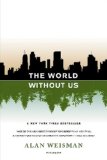Summary | Excerpt | Reviews | Beyond the Book | Readalikes | Genres & Themes | Author Bio

Critics' Opinion:
Readers' Opinion:
First Published:
Jul 2007, 336 pages
Paperback:
Aug 2008, 368 pages
 Book Reviewed by:
Book Reviewed by:
BookBrowse Review Team
Buy This Book
By 2005, Moore was referring to the gyrating Pacific dump
as 10 million square miles—nearly the size of Africa. It wasn't the only one:
the planet has six other major tropical oceanic gyres, all of them swirling with
ugly debris. It was as if plastic exploded upon the world from a tiny seed after
World War II and, like the Big Bang, was still expanding. Even if all production
suddenly ceased, an astounding amount of the astoundingly durable stuff was
already out there. Plastic debris, Moore believed, was now the most common
surface feature of the world's oceans. How long would it last? Were there any
benign, less-immortal substitutes that civilization could convert to, lest the
world be plastic-wrapped evermore?
That fall, Moore, Thompson, and Takada convened at a marine
plastic summit in Los Angeles with Dr. Anthony Andrady. A senior research
scientist at North Carolina's Research Triangle, Andrady is from Sri Lanka, one
of South Asia's rubber-producing powers. While studying polymer science in
graduate school, he was distracted from a career in rubber by the surging
plastics industry. An 800-page tome he eventually compiled, Plastics in the
Environment, won him acclaim from the industry and environmentalists alike as
the oracle on its subject.
The long-term prognosis for plastic, Andrady told assembled
marine scientists, is exactly that: long-term. It's no surprise that plastics
have made an enduring mess in the oceans, he explained. Their elasticity,
versatility (they can either sink or float), near invisibility in water,
durability, and superior strength were exactly why net and fishing line
manufacturers had abandoned natural fibers for synthetics such as nylon and
polyethylene. In time, the former disintegrate; the latter, even when torn and
lost, continue "ghost fishing." As a result, virtually every marine species,
including whales, is in danger of being snared by great tangles of nylon loose
in the oceans.
Like any hydrocarbon, Andrady said, even plastics
"inevitably must biodegrade, but at such a slow rate that it is of little
practical consequence. They can, however, photodegrade in a meaningful time
frame."
He explained: When hydrocarbons biodegrade, their polymer
molecules are disassembled into the parts that originally combined to create
them: carbon dioxide and water. When they photodegrade, ultraviolet solar
radiation weakens plastic's tensile strength by breaking its long, chain-like
polymer molecules into shorter segments. Since the strength of plastics depends
on the length of their intertwined polymer chains, as the UV rays snap them, the
plastic starts to decompose.
Everyone has seen polyethylene and other plastics turn
yellow and brittle and start to flake in sunlight. Often, plastics are treated
with additives to make them more UV-resistant; other additives can make them
more UV-sensitive. Using the latter for six-pack rings, Andrady suggested, might
save the lives of many sea creatures.
However, there are two problems. For one, plastic takes
much longer to photodegrade in water. On land, plastic left in the sun absorbs
infrared heat, and is soon much hotter than the surrounding air. In the ocean,
not only does it stay cooled by water, but fouling algae shield it from
sunlight.
The other hitch is that even though a ghost fishnet made
from photodegradable plastic might disintegrate before it drowns any dolphins,
its chemical nature will not change for hundreds, perhaps thousands of years.
"Plastic is still plastic. The material still remains a
polymer. Polyethylene is not biodegraded in any practical time scale. There is
no mechanism in the marine environment to biodegrade that long a molecule." Even
if photodegradable nets helped marine mammals live, he concluded, their powdery
residue remains in the sea, where the filter feeders will find it.
Copyright © 2007 by Alan Weisman. All rights reserved.





The Funeral Cryer by Wenyan Lu
Debut novelist Wenyan Lu brings us this witty yet profound story about one woman's midlife reawakening in contemporary rural China.
Your guide toexceptional books
BookBrowse seeks out and recommends the best in contemporary fiction and nonfiction—books that not only engage and entertain but also deepen our understanding of ourselves and the world around us.